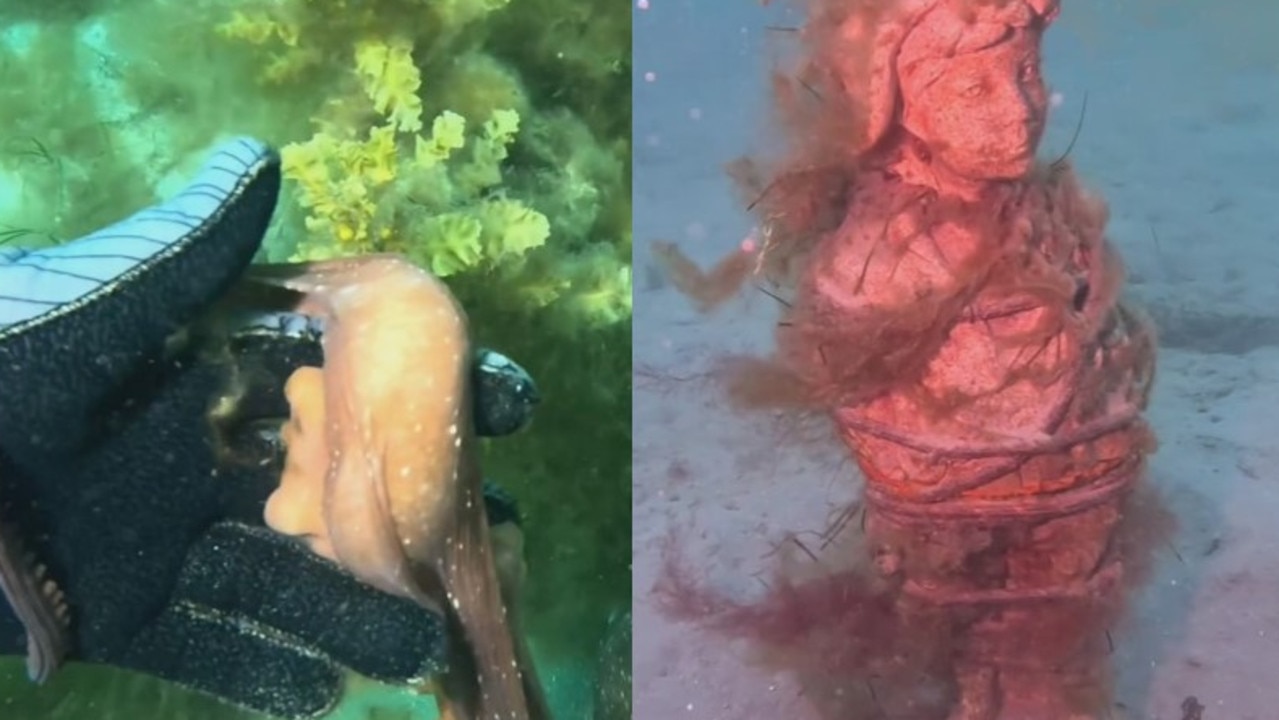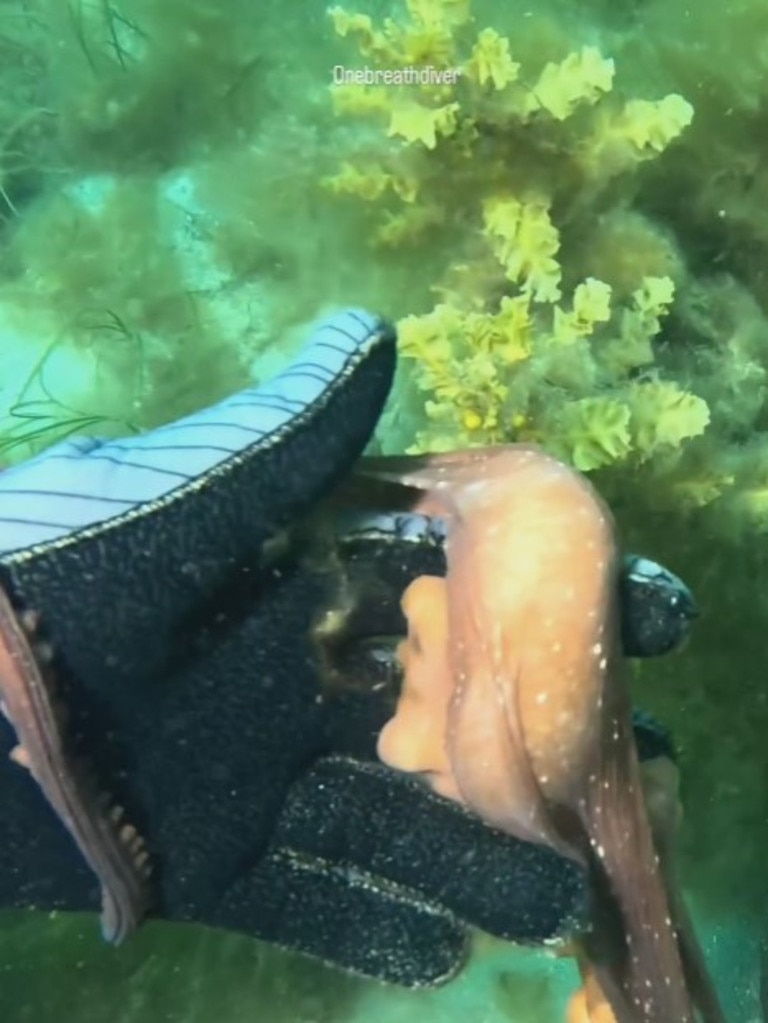Aussie diver’s magical underwater meeting with enormous octopus
After a giant octopus curled one of its three metre-long tentacles around scuba diver Jules Casey’s hand and led her on a magical mystery tour, she discovered a secret underwater shrine

READING LEVEL: GREEN
Seasoned* diver Jules Casey thought the enormous octopus was simply curious when he stretched out a long tentacle toward her and wrapped it around her hand.
But when he began swimming, leading her along, she was the one who was intrigued.
Where were they going?
“He would swim a little way, then stop and turn around to look at me, almost as though he was making sure I was still following,” Ms Casey said.
“It felt like he was coaxing me along, so I thought, OK – I’ll follow along and see what happens.”
After several minutes of swimming together through the icy waters off Victoria’s Mornington Peninsula, the unlikely new friends arrived at their destination. Ms Casey had been led to a secret shrine* on the ocean floor.
“It’s this block, like a headstone*,” she said. “I was amazed. It was very cool and pretty special.”
There was a photograph of a man holding a fluffy white dog, with a plaque bearing the name “Lorenz”.
Her new octopus friend hovered around clutching it, seemingly celebrating that he’d been able to guide Ms Casey to it.
The incredible encounter answered a mystery Ms Casey had been unable to solve after discovering several submerged garden statues, secured to the ocean floor with metal pickets.


“I’d gone out further than I normally would and the first thing I noticed were these metal star pickets in the ground,” she said.
“Then I saw the statues. I thought, ah, someone is building an artificial reef.”
Over several weeks of subsequent dives, more stakes and PVC pipes appeared, each about five metres apart.
Together with the figurines, they formed a large loop.
“The whole artificial reef thing is a little bit naughty, because Fisheries and the like wouldn’t be happy,” she said.
“But any kind of object underwater allows for soft corals and plants to grow into a kind of artificial reef, which brings life. It creates a little ecosystem*.
“Our bay is predominantly sand-based, so you can swim for miles and miles and just find grass and sand. Any time there’s a rocky structure or a pier or, like this, an artificial reef, it’ll attract life.”

Ms Casey has been diving for many years, both freediving and scuba, and is out in the water virtually every single day – even in winter.
“That’s when all the good stuff happens,” she said.
Recently, while at a local dive shop, she got chatting to a man and mentioned the incredible experience with her octopus tour guide.
“It was the person who made the reef,” Ms Casey said. “I couldn’t believe it. But he showed me a little map he’d drawn of the structures in a loop for his friend Lorenz, who’d passed away.”
Ms Casey had discovered Lorenz’s loop – with the help of the octopus. It’s the kind of magical moment waiting to be found underwater.
“It’s such another world down there,” she said.
“When you immerse yourself in that environment and it invites you in like this, it’s incredible. It’s so addictive.”


Close encounters weren’t unusual, she said.
“They’re very curious and I find more often it happens around their mating season. They’ll reach out and they’ll touch you. They do spend quite a bit of time, like exploring your camera.
“They’re amazing creatures. It’s so cool when one of them wants to come and explore you.”
Ms Casey had encountered the same animal previously while diving, but these days he has a few white patches and has lost the tips of some of his tentacles. Those physical changes suggest that he has been mating and is perhaps nearing the end of his life.
The octopus is famed for its incredible intelligence and innate* curiosity.
Maori Octopus is one of the largest and most robust* species found around Australia’s south and its native New Zealand.
They’re dark red with speckled white skin and have long, uneven tentacles – the longest of which can stretch three metres long.


POLL
- GLOSSARY
- seasoned: experienced, knows how to do something very well
- shrine: a place that people visit and treat with respect because it’s connected with someone dead who they wish to remember
- headstone: large stone at the end of a grave, usually including the name of the deceased
- ecosystem: a community of organisms and their physical environment interacting together
- innate: something one is born with that comes naturally
- robust: healthy and strong, hardy, sturdy
EXTRA READING
Octopus fossil found with extra arms
Gloomy octopuses by name and nature
Colourful dreams of a sleeping octopus
QUICK QUIZ
- Where did Ms Casey encounter the octopus?
- What were the details of the photograph at the site?
- What were the first clues Ms Casey found that she could not decipher until the encounter?
- Ms Casey said that any object left underwater allows for what?
- What might the white patches and missing tentacles suggest about the octopus?
LISTEN TO THIS STORY
CLASSROOM ACTIVITIES
1. Finish the story
“I saw her swimming towards me. I didn’t think a human would want to come and swim with me. They’re usually scared when they see me coming towards them. But I thought I’d give it a try …” Finish this story.
Time: allow at least 25 minutes to complete this activity
Curriculum Links: English
2. Extension
How do you think we find out how intelligent animals like octopuses are? Create an intelligence test for an octopus. Remember it has to be underwater!
Time: allow at least 15 minutes to complete this activity
Curriculum Links: English, Science
VCOP ACTIVITY
I spy nouns
Nouns are places, names (of people and objects), and time (months or days of the week).
How many nouns can you find in the article?
Can you sort them into places, names and time?
Pick three nouns and add an adjective (describing word) to the nouns.


